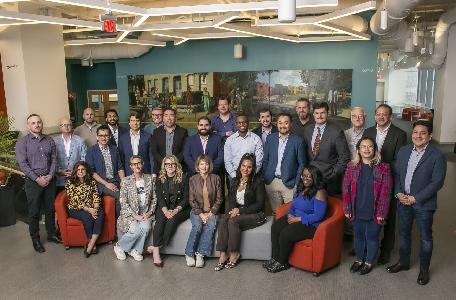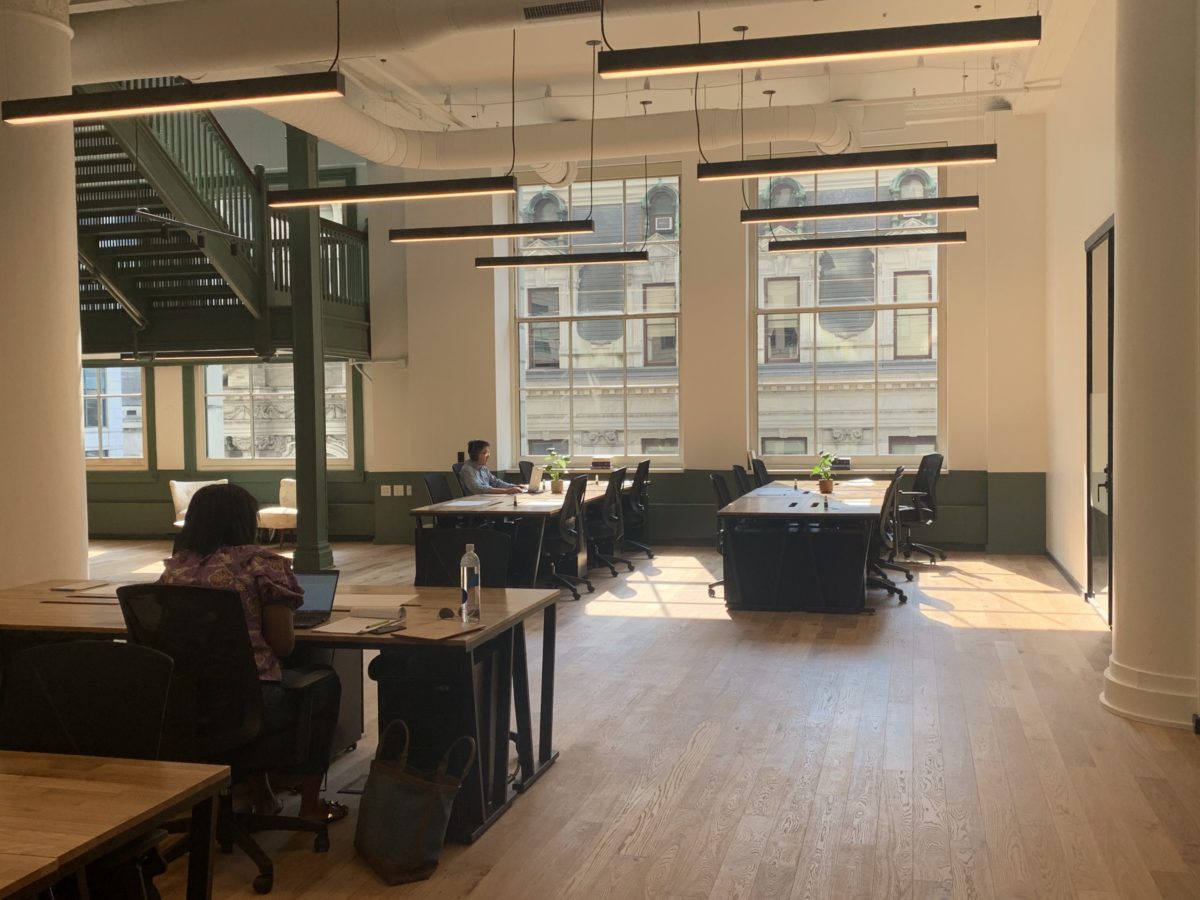Fertility company Stix is the kind of hot startup you might have expected to splurge on a swanky private office just two years ago.
If it were 2019 or earlier, the venture-backed, women-led startup could have wanted to show off its seriousness with a ribbon cutting and branded signage. Instead, they recently signed a lease in a coworking space.
Why? Because it’s 2021, not the time of breathless, place-based clout. For Stix cofounder Cynthia Plotch, paying for any office at all is more about community and a sense of feeling settled than showing off. She and cofounder Jamie Norwood briefly worked out of Offsite, Fitler Club’s coworking space, in early 2020, but because of the pandemic, their quickly growing team hadn’t all gotten the chance to work together IRL.
Their move is also a plain ol’ sign of the times.
For the last several months, companies around the world have tip-toed around their return to office plans. Some have kept with their original declarations that the arrival of COVID-19 vaccines to the general public meant the return of in-office work. Others have pushed back their dates … more than a few times. (Hi, Google.)
Many folks are toying with the idea that an office isn’t as important as we once thought. Email marketing software company AWeber made the call to let go of their Chalfont office last summer, and software company OpenForge did so recently.
The Delta variant running rampant through the U.S. is making these decisions more challenging than ever — go ahead and add back-to-office decisions to the list of uncertainties in these “increasingly uncertain times.”
Decided unanimously that a physical office just isn't necessary for building software. Heck, software by its nature is remote so time we followed suit!
Normally I'd show ya'll a picture of our new offices, but since that no longer exists here's me with the last of the boxes! 😁 pic.twitter.com/sknyzYh6Ze
— Jedidiah Weller 👑 (@jedihacks) August 31, 2021
For some, the answer is simple: coworking spaces.
Coworking often offers a mix of communal space and amenities with private offices, meeting rooms and a lower price tag than many traditional office space leases. First seen as breeding grounds for tech companies and other early-stage startups, coworking spaces have come to offer a more flexible office space option for anyone who might want a place to work that’s not their home. Even the federal government is getting in on it.
In a decade tinged entirely by a pandemic so far, we’re left wondering: Are they the future of work?
The evolution of coworking
Coworking spaces are not new to Philadelphia — in fact, quite the contrary. Indy Hall, formerly of Old City, is touted as America’s first version when it was established a decade and a half ago. Its first space offered hot desks and shared amenities for some of the early remote workers and independent contractors. Three spaces later, the community grew to include nearly anyone who wanted somewhere around other humans to work.
Versions of these spaces have filled office buildings in the city in a rush since then. In Philadelphia, you’ll find a mix of independent and boutique spaces catering to more specific audiences — think REC Philly’s studio-filled space in Center City’s Fashion District, or Leverage Coworking, a micro-coworking brand of 12 desks for other agencies to use within From the Future’s Northern Liberties office.
But much of Philly’s coworking space is operated by national or global brands like MakeOffices and WeWork. When 2020 began, our annual coworking guide found that the city had about 1.1 million square feet of coworking space, comprising more than 1% of all the office space in the city.
We’ve since seen these spaces in flux, especially in the last year and a half while operators face many of the same challenges about in-person work that corporations do.

Inside Indy Hall’s old 399 Market St. space. (Courtesy photo)
Indy Hall, which went entirely remote at the start of the pandemic last year, closed its doors in July. Founder Alex Hillman said the org was at risk of losing both the space and the business if they tried to reopen, and took the “least complicated option.”
“As we explored our options with the landlord’s legal and finance teams, the least complicated option was offered and the one we took,” Hillman said then. “While we didn’t necessarily want to move out, we were able to negotiate an unburdened opportunity to rebuild something even better than before and without the pressure of filling a space by a certain date. I consider that a gift.”
Indy Hall has long fosterd an online community, and in the pandemic — like most computer-enabled work — it became a lifeline for folks to stay connected when they couldn’t gather IRL. A lot of other coworking spaces would essentially be left with nothing if they took away their in-person space, Hillman said, but the Indy Hall team focused on putting all their energy into what did work: their existing community.
“What I find interesting is that the pandemic didn’t really change Indy Hall, so much as it meant using new tools to do what we’ve always done,” the founder said this month. “In some ways, the pandemic was a chance for Indy Hall members to do what we’ve always done best, which is support one another, however it’s needed.”
Before the pandemic, Hillman penned some thoughts on the evolution of coworking, breaking into waves, pre- and post-mainstream availability. In the third wave, he said, folks getting it right will be those “investing in research and education instead of the fanciest furniture and free lunches.” They’ll be good at the operations side and the community development side.
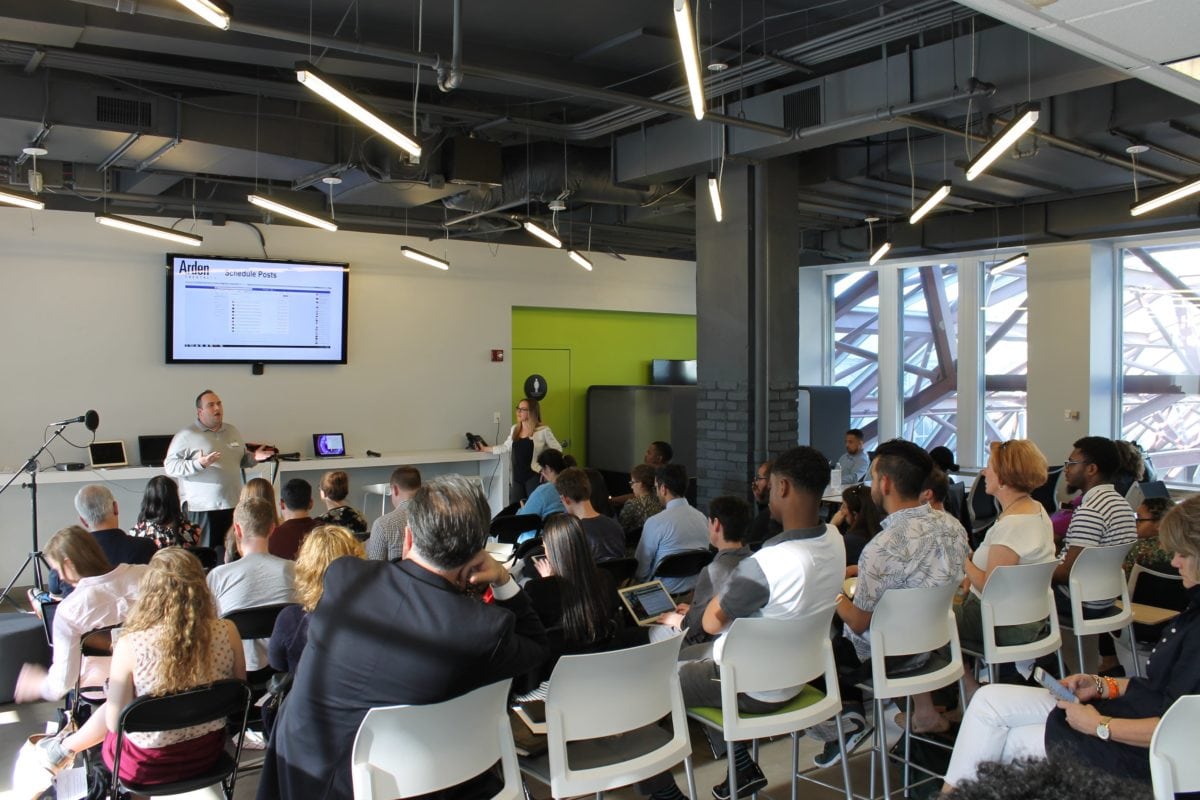
76 Forward’s former Washington Square location. (Technical.ly photo)
That’s also been a focus for 76 Forward, recently rebranded from 1776, in an effort “to re-establish their identity and re-ignite their mission.” The coworking company is among a handful of coworking communities to close their doors in Philadelphia in recent months, and plans to focus on communities that aren’t already highly trafficked, like New York or Boston.
“On the one hand, cultivating hyper-local ecosystems is key to (re)building an economy and encouraging sustainability and future growth,” President Charlotte Lee said in a recent Technical.ly Slack AMA. “So focusing on the local is vital to maintaining and supporting our own, smaller communities.”
What does coworking look like right now?
John Heinz, associate director of sales and relationship management at CIC Philadelphia, said the pandemic has radically changed the way people work. Coworking’s design, often bringing as many people as possible into a shared space, is “not a very good business model during a pandemic of an airborne respiratory virus,” he said.
For that reason, 76 Forward has seen a desire for dedicated meeting room and desk packages — say, 10 desks for a team of 30 or 40 people who will come in on a rotating schedule, Lee said. And those private offices offered by most coworking companies are getting scooped up fast, she added.
“I think coworking and shared spaces, and especially innovation hubs and districts are going to become much more relevant in terms of where people do business,” Lee said. “I think we are trending towards larger corporate entities offering and even encouraging remote work, so spaces like all of ours will be where folks need to convene for collaboration and fellowship.”
Mindspace, an international coworking company headquartered in Israel, opened up shop in Philadelphia earlier this year. Its 42,000 square feet of the Wanamaker Building adjacent to City Hall offers a mix of hot desks, dedicated desks and private offices. There’s private offices on the floor that can be rented by a company to host their workforce from two to 29 workstations, and five private suites that host teams of about 40 to 60 people.
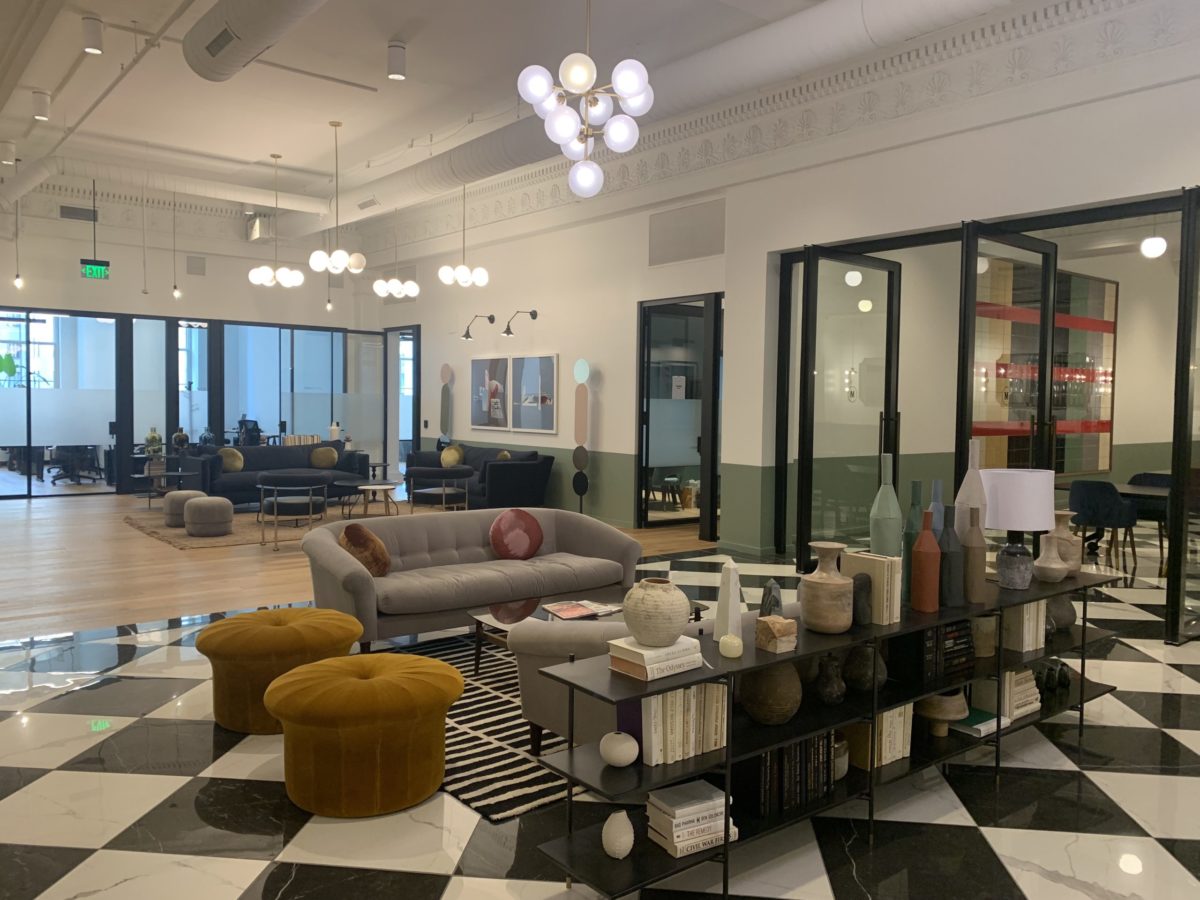
Inside Mindspace Philadelphia. (Photo by Paige Gross)
The company is catering to the idea that companies with hundreds of employees might want to ditch their corporate campuses and instead opt for flexible, private working space inside a coworking suite. Mindspace founder Yotam Alroy told Technical.ly the idea of a “one-stop-shop for flex space, community and a hassle-free customer experience” is growing stronger.
A 10-year office lease just isn’t appealing anymore, Alroy said. We live in a time when safety conditions can change day by day. Companies are much more likely to go for the deal that offers them the ability to make shorter-term decisions when it comes to where and how its employees will work.
“When you look at all of the facts, COVID is an accelerator” of the coworking industry, Alroy said. “The craziness you see around COVID will slow, but the fact that it tells you not to make long plans, I think that’s going to stick.”
When lockdowns first eased last year, the first people to come back to coworking spaces were contractors, freelancers and small businesses, Alroy noted. It’s easier for a small group of people to be able to check in about working conditions than to organize a policy for a large corporation. And without coworkers to form a community, those working independently were some of the first to venture back out to the org’s events and programming.
Many coworking spaces also offer something that traditional office buildings or corporate campuses do not: They look really good. Alroy described Mindspace as a “cool, vibrant atmosphere,” and its Philly location leans heavily on European-centric design, as Josh Evans, the Philly senior community manager told me when I visited the new space in July. It’s not the main reason people are interested in coworking, but a beautiful Zoom background or chic conference room to bring clients to sure doesn’t hurt.
It was, indeed, one of the reasons Stix chose to join coworking spot Bond Collective in Center City. The company’s team is hybrid and split between Philadelphia, Brooklyn and Massachusetts, but the Philly team wanted a designated space to collaborate.
“It’s really pretty, honestly, it’s a really beautiful space with a sense of space,” Plotch said. “I think a lot of coworking spaces all look exactly the same — black metal frames, steel, glass window boxes. We wanted to be in a space that we could nest in, and Bond let us do that.”
Their membership also offers outdoor space, as well as the ability to set up shop without the heavy lifting of cleaning, managing the space and setting up their own utilities. Stix recently grew, and now has nine team members. Plotch said they went looking for a space because they all genuinely have fun working together and were missing that option as a fully remote team.
So, is coworking the future of work?
Multiple people who spoke about it over the past month agreed that they don’t know if it is, really — even those whose jobs it is to promote coworking as the future of work. But they know the pandemic accelerated what was already coming down the pipeline: People need new ways to operate businesses.
What that will look like moving forward will change, likely as the pandemic evolves and remote and hybrid work become even more commonplace.
“The traditional office is dead. An increasing number of people will likely have some form of hybrid or remote work moving forward. But we have real human needs for community, for belonging, for place,” Heinz said. “Coworking spaces provide that. I think how coworking spaces provide those things will change in the years to come as now people have more freedom than ever to choose where and next to whom they will work.”
Join the conversation!
Find news, events, jobs and people who share your interests on Technical.ly's open community Slack

Philly daily roundup: A better coffee supply chain; Philly Tech Week returns; Apply to Pennovation Accelerator
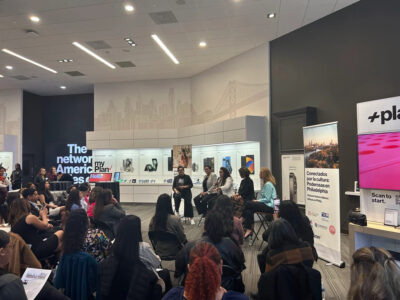
Philly daily roundup: Startups want office culture; New Venture Lab cohort; Penn Med's new AI leader

Will the life sciences dethrone software as the king of technology?
